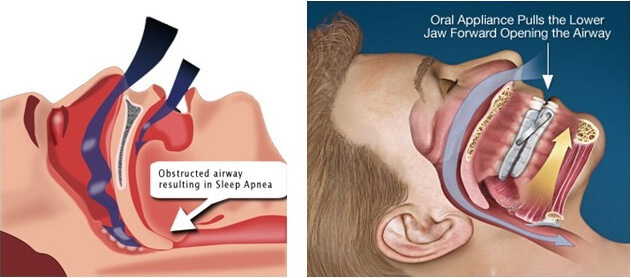Obstructive Sleep Apnea
- Home
- OSA
OSA - Obstructive Sleep Apnea
Apnea is defined as the apsence of breathing for ten seconds or more and can be considered mild, moderate, or severe based on the number of apneic events you experience throughout the night. Its primary cause is due to the collapse of the airway by the tongue or a small airway that can be easily blocked by the soft tissues of your throat or your tongue.

An apneic event will end after your brain has demanded more effort from your diaphragm and chest muscles as well as releasing the stress hormone, cortisol, eventually causing you to reposition your body in order to open up your airway. At this point you gasp for air until the airway collapses again, repeating the cycle. Instead of a healthy oxygen level and sleep cycle, an apneic cycle starves your organs of oxygen and prevents you from reaching the necessary levels of deep and REM sleep along with all of their benefits.
Prevalence
Obstructive Sleep Apnea (OSA) is arguably the most common non-communicable chronic disease. Over 42 million people are thought to have some type of sleep-related breathing disorder, with 1 in 5 adults experiencing mild OSA. In middle-aged adults, 9% of women and 25% of men suffer from OSA. Even more disturbing, nearly 90% of patients suffering from OSA are undiagnosed and about 50% show no symptoms!
Risk Factors

- Obesity (BMI > 30)
- Large neck circumference (> 17" for men, > 16" for women)
- Use of alcohol, sedatives, or tranquilizers
- Smoking
- Family history of OSA
- Advanced age
- Sleeping on your back
Signs & Symptoms
- Loud and chronic snoring
- Choking or gasping for air followed by pauses
- Excessive daytime sleepiness
- Morning headaches
- Inability to concentrate
- Memory or learning problems
- Frequent urination throughout the night
- Acid reflux
- Hypertension
- Depression
Why should I treat my Sleep Apnea?
OSA can harm nearly every system in our body due to the constant stress placed on it during sleep every night, plus our body can no longer properly heal itself and process new information without a healthy sleep cycle. Below you will see you OSA plays a significant role in many of the common chronic diseases within our society:
- OSA is a completely independent risk factor for high blood pressure, seperate from diet and family history.
- About 76% of heart attack victims also had a form of sleep-related breathing disorder, including OSA.
- More than 65% of stroke victims also have sleep apnea, and those with OSA are at an increased risk by 200% of having a stroke.
- OSA has been found to contribute to insulin resistance due to the high levels of cortisol, a stress hormone, released during each apneic event, leading to type 2 diabetes and obesity. Almost 50% of patients with type 2 diabetes also have sleep apnea. The incidence increases to 86% for obese patients with type 2 diabetes.
- Patients with OSA are up to 15 times more likely to get into an auto accident due to falling asleep at the wheel. It is estimated that 1 in 6 fatal road accidents is caused by fatigue.